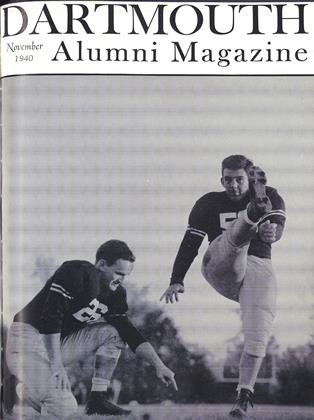IN ACCORDANCE WITH the terms of the charter, Eleazar Wheelock was empowered to appoint his successor. For the position he selected his son, John, then but 35 years of age, a graduate of the College in its first class and, at the time, LieutenantColonel in the Revolutionary army. Perforce, the debonair young military officer was required to turn himself into the dignified, learned and austere pedagogue, such as the head of a college, in those days, was supposed to be. Most effectively did he carry out that process.
Upon his accession he found the institution in the most serious financial condition. Devotedly and gallantly, with both courage and good judgment, he attacked the problem and so well directed and successful were his endeavors that within fifteen years the institution was working on a sound basis, capable of doing its task as effectively as any of its sister colleges. A suitable home was provided (1791) in the first Dartmouth Hall and the institution was enlarged in 1798 by the addition of the Dartmouth Medical School. Student attendance became far larger than it had ever been before.
At the end, however, friction developed between the President and the Trustees as to College control. Beginning with a petty squabble in the local church, the contest became so acute that in 1815 the President was removed by the Trustees, after 36 years of service. The contest did not end at that point, however. Wheelock carried the dispute into the public arena, political contests in the state turned upon the issue, the legislature modified the charter with the object of restoring the President to control and a hectic struggle was waged in the courts, which, in its final issue, in the Supreme Court of the United States, with Daniel Webster making his great plea, has become a classic in American jurisprudence. The outcome was the defeat of the Wheelock party, but its leader had already passed from the scene.
The difficulties into which John Whee lock brought the College in his later years should not blind us to the fact that unquestionably he saved it from destruction in his earlier days.
II. JOHN WHEELOCK 1754-1817 Dartmouth, Class 1771; President, 2779-/575
 View Full Issue
View Full Issue
More From This Issue
-
 Article
ArticleCharles A. Proctor
November 1940 By JOHN HURD JR. '21 -
 Article
ArticleCan I Get In?
November 1940 By COREY FORD -
 Class Notes
Class Notes1926*
November 1940 By CHARLES S. BISHOP, CLARENCE G. MCDAVITT JR. -
 Class Notes
Class Notes1918*
November 1940 By ERNEST H. EARLEY, DONALD L. BARR -
 Class Notes
Class Notes1931*
November 1940 By CHARLES S. MCALLISTER, CRAIG THORN JR. -
 Class Notes
Class Notes1921*
November 1940 By CHARLES A. STICKNEY JR., ROGER C. WILDE







